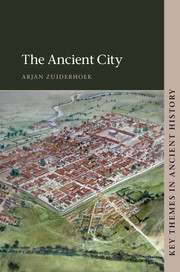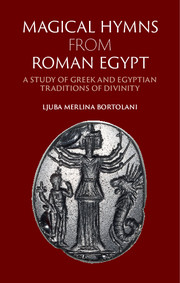Refine search
Actions for selected content:
23990 results in Ancient history

The Ancient City
-
- Published online:
- 10 November 2016
- Print publication:
- 31 October 2016

Magical Hymns from Roman Egypt
- A Study of Greek and Egyptian Traditions of Divinity
-
- Published online:
- 03 November 2016
- Print publication:
- 10 October 2016
Glossary
-
- Book:
- The Ancient City
- Published online:
- 10 November 2016
- Print publication:
- 31 October 2016, pp xii-xiv
-
- Chapter
- Export citation
Chapter 4 - Urban Landscape and Environment
-
- Book:
- The Ancient City
- Published online:
- 10 November 2016
- Print publication:
- 31 October 2016, pp 56-77
-
- Chapter
- Export citation
Chapter 1 - Introduction: The Ancient City as Concept and Reality
-
- Book:
- The Ancient City
- Published online:
- 10 November 2016
- Print publication:
- 31 October 2016, pp 1-19
-
- Chapter
-
- You have access
- HTML
- Export citation
Chapter 6 - Civic Ritual and Civic Identity
-
- Book:
- The Ancient City
- Published online:
- 10 November 2016
- Print publication:
- 31 October 2016, pp 94-105
-
- Chapter
- Export citation
Figures
-
- Book:
- The Ancient City
- Published online:
- 10 November 2016
- Print publication:
- 31 October 2016, pp x-x
-
- Chapter
- Export citation
Bibliography
-
- Book:
- The Ancient City
- Published online:
- 10 November 2016
- Print publication:
- 31 October 2016, pp 191-220
-
- Chapter
- Export citation
Chapter 5 - Politics and Political Institutions
-
- Book:
- The Ancient City
- Published online:
- 10 November 2016
- Print publication:
- 31 October 2016, pp 78-93
-
- Chapter
- Export citation
Copyright page
-
- Book:
- The Ancient City
- Published online:
- 10 November 2016
- Print publication:
- 31 October 2016, pp vi-vi
-
- Chapter
- Export citation
Acknowledgements
-
- Book:
- The Ancient City
- Published online:
- 10 November 2016
- Print publication:
- 31 October 2016, pp xi-xi
-
- Chapter
- Export citation
Chapter 2 - Origins, Development and the Spread of Cities in the Ancient World
-
- Book:
- The Ancient City
- Published online:
- 10 November 2016
- Print publication:
- 31 October 2016, pp 20-36
-
- Chapter
- Export citation
Contents
-
- Book:
- The Ancient City
- Published online:
- 10 November 2016
- Print publication:
- 31 October 2016, pp ix-ix
-
- Chapter
- Export citation
Chapter 7 - Urban Society: Stratification and Mobility
-
- Book:
- The Ancient City
- Published online:
- 10 November 2016
- Print publication:
- 31 October 2016, pp 106-130
-
- Chapter
- Export citation
Dedication
-
- Book:
- The Ancient City
- Published online:
- 10 November 2016
- Print publication:
- 31 October 2016, pp vii-viii
-
- Chapter
- Export citation
Index
-
- Book:
- The Ancient City
- Published online:
- 10 November 2016
- Print publication:
- 31 October 2016, pp 221-226
-
- Chapter
- Export citation
Chapter 8 - The Urban Economy
-
- Book:
- The Ancient City
- Published online:
- 10 November 2016
- Print publication:
- 31 October 2016, pp 131-148
-
- Chapter
- Export citation
Bibliographical Essay
-
- Book:
- The Ancient City
- Published online:
- 10 November 2016
- Print publication:
- 31 October 2016, pp 186-190
-
- Chapter
- Export citation
Chapter 9 - City-States and Cities and States
-
- Book:
- The Ancient City
- Published online:
- 10 November 2016
- Print publication:
- 31 October 2016, pp 149-166
-
- Chapter
- Export citation
Chapter 3 - City and Country
-
- Book:
- The Ancient City
- Published online:
- 10 November 2016
- Print publication:
- 31 October 2016, pp 37-55
-
- Chapter
- Export citation
